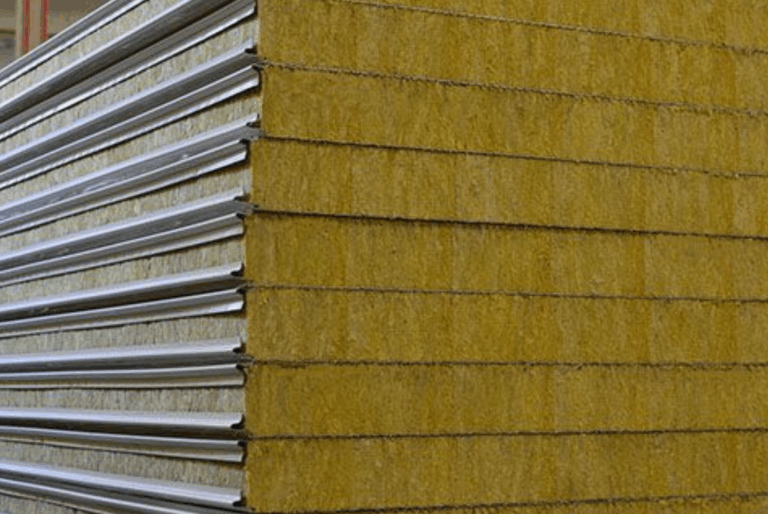What Are Insulated Panels?
Insulated panels, also known as sandwich panels, are prefabricated building elements made up of two metal sheets with an insulating core in between. They are designed to provide thermal efficiency, structural protection, and quick installation, making them widely used in industrial warehouses, logistics centers, cold storage rooms, commercial buildings, and agricultural facilities.
The core can be made of materials such as PUR (polyurethane), PIR (polyisocyanurate), or mineral wool, each offering specific properties suited to different needs—whether it’s thermal resistance, fire protection, or sound insulation. Thanks to their versatility, insulated panels have become a modern and efficient solution for addressing climate challenges, energy consumption, and building safety.
When Should You Use Insulated Panels?
Using insulated panels is essential in construction projects that require temperature control, energy efficiency, structural safety, or protection against fire and moisture. Here are some common scenarios where they are especially recommended:
• Regions with extreme climates, whether it’s intense heat or constant cold.
• Industrial or logistics facilities aiming to reduce HVAC energy costs.
• Cold storage rooms or areas dedicated to preserving perishable products.
• Agricultural projects that require stable environmental conditions for storage or production.
• Commercial centers, hospitals, or public buildings that must comply with energy efficiency regulations.
In addition to thermal performance, insulated panels also offer faster construction times, low maintenance needs, and a clean, modern appearance.
Common Mistakes When Choosing Insulated Panels (and How to Avoid Them)
When selecting insulated panels, there are frequent mistakes that can compromise the efficiency and performance of the entire project. Below are the most common ones — and how to avoid them:
1. Choosing the Wrong Core Type
Each core material has different characteristics. For example, PIR offers better thermal resistance than PUR, while mineral wool is ideal for environments requiring high fire resistance or sound insulation.
How to avoid it: Carefully analyze the specific needs of your project and consult with an expert before making a decision.
2. Selecting the Wrong Panel Thickness
Choosing panels with insufficient thickness can result in energy loss, condensation, or even structural weaknesses.
How to avoid it: Determine the appropriate thickness based on the building’s purpose, geographic location, and thermal performance requirements.
3. Ignoring Building Orientation and Solar Exposure
Failing to consider factors like building orientation, roof type, and sun exposure can reduce insulation effectiveness.
How to avoid it: Work with architects or engineers who integrate these elements into the planning and design process.
4. Overlooking the Quality of Seals and Joints
Poor installation or low-quality sealing systems can lead to air leaks, moisture infiltration, or reduced thermal efficiency.
How to avoid it: Choose reliable suppliers and demand certified panels with high-quality fastening and sealing systems.
5. Focusing Only on the Lowest Price
While budget is important, choosing panels solely based on price can lead to long-term issues like underperformance, early wear, or costly replacements.
How to avoid it: Evaluate the long-term cost-benefit ratio and the manufacturer’s reputation before purchasing.
About McMillan Insulated Panels
At McMillan Insulated Panels, we specialize in manufacturing high-quality insulated panels for roofs, walls, and cold storage facilities. Our focus is on providing durable, efficient, and climate-adapted solutions, especially for regions with demanding environmental conditions.
Our product line includes panels with PIR, PUR, and mineral wool cores, as well as polycarbonate panels, advanced fastening systems, specialty coatings, and custom finishes tailored to each project.
We work hand-in-hand with builders, architects, and developers to ensure each structure is equipped with the right panel from the start.
Although we serve a wide geographic range, most of our clients and projects are based in California, Texas, and Florida, where specific climate challenges like high temperatures, humidity, and strong sun exposure make our solutions especially valuable.
Find out more information at our website:
Choosing insulated panels might seem like a straightforward task, but making the wrong decisions during this phase can seriously impact a building’s energy performance, durability, and overall safety. That’s why it’s essential to seek expert technical guidance and work with manufacturers that guarantee certified, high-performance products tailored to your project’s specific needs.
In today’s construction landscape—where time, energy, and efficiency are critical resources—making the right choice from the beginning is the smartest long-term investment.
At McMillan Insulated Panels, we’re here to help you avoid costly mistakes and make informed decisions. Our team of experts is ready to guide you in selecting the ideal panel for your project—no matter the size or complexity.
💬 Request expert technical advice
💰 Get a free, no-obligation quote
📞 Contact us today and discover why we’re a trusted leader in insulated panel solutions
👉 Visit our contact page or give us a call. We’re here to help you build smarter!
Contact Page Contact





